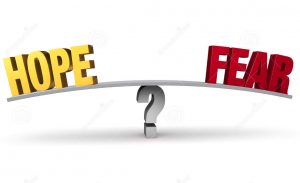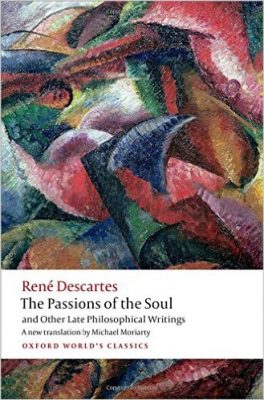 In my quest to find like-minded people, who want to better humanity, I am watching videos, and am exposed the feelings of the speaker, commentator, or whoever is in the video.
In my quest to find like-minded people, who want to better humanity, I am watching videos, and am exposed the feelings of the speaker, commentator, or whoever is in the video.
What prompted this article is a bout of weeping… for no reason.
I am sitting here examining the context inside which this happened, and I Have had no reason to be sad, to weep.
So I ask, somewhat late, this usual question: is this mine? The answer is NO. Does this belong to one of my students? no. one of my readers? no. to the speaker on the video? yes.
Now, this was today. But whenever I watch a sales video… or maybe even read a sales email…
I get the feeling of the person who wrote it.
Most often: hope+fear: A perfect prescription for misery. 1
Hope is bad for you. Why? because hope doesn’t let you fully own that you need to do the best you can, and the rest is not up to you. And the fear is a natural result of not being willing to own that whatever will happen is out of your hand.
You can’t expect anything… in fact, you have no Business to expect anything.
Your job is to be honorable when you get the results, which are a feedback to what you did.
Cause and effect. Physical law…
Analyze the effect, make tweaks, and do it again. That is what someone who is honorable does.
Resigning, throwing your hands up, complaining, giving up… that is what you do. Why? Because being honorable was never taught to you.
Reality is like playing chess. You can be expecting that reality will do what reality will do.
A good chess player makes their move, sees the counter move of his opponent, looks deep, and makes another move.
And so it goes till the end of the game.
The only difference between a chess game and life is this: Life isn’t intelligent in this regard: it isn’t out to get you… a chess opponent is.
But unless you play the game of life at life’s terms, you are going to be miserable, because you are going to be ineffective. And you have been.
I hope the reason you are here is to learn to play the game of life better. To be prepared, ready, and play well.
My job is to point out all the ways you are not prepared, mislead, misbehaving, and therefore losing.
Winning isn’t the point, the point is playing.
Most people have given up so long ago, they don’t even know that they could be playing.
Life’s purpose is living.
You were born to live.
Not a fixed kind of life, not to be happy, not to help people.
No. You were born to live. And if that is the purpose of life, wouldn’t it be intelligent to learn to live? Like a person?
Instead of being a puppet, or a rudderless ship, or a leaf blown about by the wind?
There are, as Tolstoy said, lots of ways to not live… and only one way to live…
Living is active. Living is owning the life you got. Honoring the life you got. Honoring yourself. Playing the best you can, and getting better at it.
OK, here is an email I edited to match what I want it to say… I received it today from one of the only marketers I feel affinity for. He feels like a straight shooter, like me.
Are you afraid of failure?
I don’t know how many times people have said to me, “What if I fail…” And how many times they didn’t say it out loud…
My usual response is, “So what? Join the club. Everyone fails. It’s what you do with it that matters.”
But recently I heard the perfect quote for these situations.
Sochiro Honda, the founder of Honda Motor Company said…
“Success is 99% Failure.” That quote is a little confusing. Here’s another one from him which makes it more clear.
“Success represents the 1% of your work which results from the 99% that is called failure.”
Failure is a stepping stone to success. It’s a natural progression.
Instead of failure being something to be afraid of, it is to be embraced.
When you were a child and took your first steps, did you ever fall flat on your butt? I’ll bet you did…just like everyone else.
What about the first time you got on a bicycle? This is embarrassing, but I remember the first day I got my driver’s license.
I only had a license for a few hours and was out with my buddies.
I backed into a parked truck in a McDonald’s parking lot.
Luckily, my parents weren’t angry. In fact, my father burst out laughing when I told him.
My mother bragged to him that “I drove just like her” earlier that day.
Accidents didn’t become a trend although I did have one more during my teenager days.
If you pick up golf tomorrow, do you expect to play on the PGA tour next week?
Or join NBA the first time you hold a basketball in your hands?
No. In sports, it is clear, even to you, that you have to practice.
In science, it’s about a process of experimentation until a new discovery is made.
In business, it is about testing different approaches until you find the one customers love.
In advertising, it’s about optimizing each step of your campaign.
Every offer isn’t going to be a home run.
Every email isn’t going to produce a landslide of sales.
And playing it safe…doing what everyone else does…isn’t the route to innovation and improvement.
Often the greatest improvements are made when you try something from outside of your industry.
It’s a risk…but the greatest rewards come from the greatest risks.
In investing, they talk about managing risk.
If you invest money in CDs, you have very little risk. But you also get almost no return. In fact, once you count inflation, you’re often getting negative returns.
Stocks, bonds, real estate, and commodities like gold all introduce additional risks. But there are also greater returns available here.
But where’s the greatest potential return for your investment?
It’s in your own backyard in your own business.
I’ve never earned a return in any outside investment like I have in my own business.
Not even close.
But that also means you need to take some intelligent risks in your own business.
Quit running from failure.
Manage your risk. Keep mistakes small. Let the winners multiply and run.
Join the Club…the club where winners hang out.
OK, he has a monthly mentor club… I have the 67 step coaching program. I only accept people I can see that I want to work with…
The best screening tool has been the Starting Point Measurements…
1. your vibration (1-1000)
2. your overall intelligence, emotional, intellectual, spiritual, body, relationship, etc.
3. the number of spiritual capacities you have
4. your soul correction (your machine) I need your date of birth for this https://yourvibration.com/sc is a depository of soul correction articles.
5. do you have attachments?
6. the level of your health (1-100)
7. the level of your cell hydration (1-100)
8. your relationship to feedback and instruction
9. The level of discomfort you are willing to allow without the urge and the habit of “fixing” it… dispersing, leaking, it. This is your TLB score…
I am contemplating adding another measure… #10: how comfortable you are living in the matrix, being a cog in the machine
The more comfortable you are, the less you’ll be willing to do my program…
Click on the payment button to send me a donation to get your starting point measurements. I’ll send you my answer in email…

Click to get your Starting Point Measurements Report
Not all philosophers live on the 13th floor… in fact, almost none of them does… But I wanted to illustrate that I am not the first to see the dynamic aof hope and fear… but looking at it from the 13th floor perspective, the Floor of the Feelings, the interplay is a sign of being trapped… and having no freedom to get what you get… you want what you hope for, or alternately, you get what you are afraid to get… both are debilitating. The only healthy relationship with results is saying: the results are the results, let’s see what they are saying, where they are taking us…
Descartes on the Vital Relationship Between Hope and Fear
“When hope is so strong that it altogether drives out fear, its nature changes and it becomes complacency.”
 Hope — a faculty decidedly different from and far more muscular than optimism — remains our most potent antidote to the passivity and resignation of cynicism. The great humanistic philosopher and psychologist Erich Fromm admonished against the common laziness of optimism and pessimism, but he extolled the counterpoint to both — active hope that empowers us “to think the unthinkable, yet to act within the limits of the realistically possible.”
Hope — a faculty decidedly different from and far more muscular than optimism — remains our most potent antidote to the passivity and resignation of cynicism. The great humanistic philosopher and psychologist Erich Fromm admonished against the common laziness of optimism and pessimism, but he extolled the counterpoint to both — active hope that empowers us “to think the unthinkable, yet to act within the limits of the realistically possible.”“Hope is a gift you don’t have to surrender, a power you don’t have to throw away,”
Rebecca Solnit wrote two generations later in her lucid and luminous manifesto for our grounds for hope and action in dark times. The philosopher Jonathan Lear termed those grounds “radical hope” — the kind of hope that “anticipates a good for which those who have the hope as yet lack the appropriate concepts with which to understand it.” But such anticipation of the unimaginable is inherently in constant dialogue with the unknown — with the fearsome possibility of not obtaining the object of hope and with the concomitant potential for despair.
 That necessary complementary of hope and fear in the face of the unknown is what the great French philosopher, scientist, and mathematician René Descartes (March 31, 1596–February 11, 1650), patron saint of reason, explores in a section of The Passions of the Soul (public library) — his final published work, which gave us Descartes on the cure for indecision and how we acquire nobility of soul.
That necessary complementary of hope and fear in the face of the unknown is what the great French philosopher, scientist, and mathematician René Descartes (March 31, 1596–February 11, 1650), patron saint of reason, explores in a section of The Passions of the Soul (public library) — his final published work, which gave us Descartes on the cure for indecision and how we acquire nobility of soul.Portrait of Descartes after Frans Hals, 1648 Descartes writes:
The mere fact of thinking that a good may be acquired or an evil avoided is sufficient to produce the desire for this to come to pass. But when, over and above this, we consider whether our desire is likely to be satisfied or not, the idea that it is likely arouses hope in us, and the idea that it is unlikely arouses fear, of which one variety is jealousy.
He considers the common root and complementary of hope and fear:
Hope is a disposition of the soul to persuade itself that what it desires will come to pass, which is caused by a particular movement of the spirits, namely, by that of mingled joy and desire. And fear is another disposition of the soul, which persuades it that the thing will not come to pass. And it is to be noted that, although these two passions are contrary, one may nonetheless have them both together, that is, when one considers different reasons at the same time, some of which cause one to judge that the fulfillment of one’s desires is a straightforward matter, while others make it seem difficult.
And neither of these passions ever accompanies desire without leaving some room for the other.
Descartes
Descartes argues that a severe imbalance of the two is equally deleterious, whichever direction it may tip in — just as an excess of fear may drive out all hope and leave us paralyzed to act, an excess of optimism that drives out all uncertainty and fear is just as paralytic to fruitful action, for it renders us complacent. In a sentiment that calls to mind Kierkegaard’s insistence that anxiety powers rather than hinders creativity, Descartes writes:
When hope is so strong that it altogether drives out fear, its nature changes and it becomes complacency or confidence. And when we are certain that what we desire will come to pass, even though we go on wanting it to come to pass, we nonetheless cease to be agitated by the passion of desire which caused us to look forward to the outcome with anxiety. Likewise, when fear is so extreme that it leaves no room at all for hope, it is transformed into despair; and this despair, representing the thing as impossible, extinguishes desire altogether, for desire bears only on possible things.
Half a millennium later, The Passions of the Soul remains a masterwork of extraordinary insight into the workings of the human mind, heart, and spirit. Complement this particular portion with Victoria Safford on what it means to stand at the gates of hope and E.B. White’s remarkable letter to a man who had lost hope for humanity, then revisit Descartes’s twelve timeless tenets of critical thinking.
